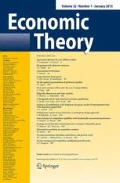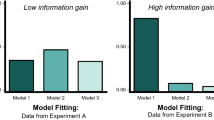Summary
Experimental games typically involve subjects playing the same game a number of times. In the absence of perfect rationality by all players, the subjects may use the behavior of their opponents in early rounds to learn about the extent of irrationality in the population they face. This makes the problem of finding the Bayes-Nash equilibrium of the experimental game much more complicated than finding the game-theoretic solution to the ideal game without irrationality. We propose and implement a computationally intensive algorithm for finding the equilibria of complicated games with irrationality via the minimization of an appropriate multi-variate function. We propose two hypotheses about how agents learn when playing experimental games. The first posits that they tend to learn about each opponent as they play it repeatedly, but do not learn about the population parameters through their observations of random opponents (myopic learning). The second posits that both types of learning take place (sequential learning). We introduce a computationally intensive sequential procedure to decide on the informational value of conducting additional experiments. With the help of that procedure, we decided after 12 experiments that our original model of irrationality was unsatisfactory for the purpose of discriminating between our two hypotheses. We changed our models, allowing for two different types of irrationality, reanalyzed the old data, and conducted 7 more experiments. The new model successfully discriminated between our two hypotheses about learning. After only 7 more experiments, our approximately optimal stopping rule led us to stop sampling and accept the model where both types of learning occur.
Similar content being viewed by others
References
R. Aumann. Survey of repeated games. InEssays in Game Theory and Mathematical Economics in Honor of Oskar Morgenstern. Wissenschaftsverlag, Bibliographisches Institute, Mannheim, 1981.
R. Aumann. Preliminary notes on integrating irrationality into game theory. Mimeo, 1988.
J. Berger.Statistical Decicion Theory and Bayesian Analysis. Springer-Verlag, 1985.
K. Binmore. Modeling rational players. Technical report, London School of Economics, 1986.
M. El-Gamal, R. McKelvey, and T. Palfrey. A bayesian sequential experimental study of learning in games.Journal of the American Statistical Association, 88:428–435, 1993.
M. El-Gamal and T. Palfrey. Vertigo: Comparing structural models of imperfect behavior in experimental games.Games and Economic Behavior, 1993. Forthcoming.
D. Kreps, P. Milgrom, J. Roberts, and R. Wilson. Rational cooperation in the finitely repeated prisoner's dilemma.Journal of Economic Theory, 27:245–252, 1982.
R. D. McKelvey. A Liapunov function for Nash equilbiria. Mimeo, 1990. California Institute of Technology.
R. D. McKelvey and T. Palfrey. An experimental study of the centipede game.Econometrica, 60:803–836, 1992.
N. Megiddo. Remarks on bounded rationality, 1986. IBM Research Report.
W. Press, B. Flannery, S. Teukolsky, and W. Vetterling.Numerical Recipes in C: The Art of Scientific Computing. Cambridge University Press, Cambridge, 1988.
P. Reny Rationality, common knowledge, and the theory of games. Mimeo, 1985. Princeton University.
R. Rosenthal. Games of perfect information, predatory pricing, and the chain store paradox.Journal of Economic Theory, 25:92–100, 1982.
Author information
Authors and Affiliations
Additional information
We acknowledge the financial support from NSF grant #SES9011828 to the California Institute of Technology. We also acknowledge the able research assistance of Mark Fey, Lynell Jackson and Jeffrey Prisbrey in setting up the experiments, recruiting subjects and running the experiments. We acknowledge the help of the Jet Propulsion Laboratory and its staff members for giving us access to their Cray XMP/18, and subsequently their Cray YMP2E/116.
Rights and permissions
About this article
Cite this article
El-Gamal, M.A., McKelvey, R.D. & Palfrey, T.R. Learning in experimental games. Econ Theory 4, 901–922 (1994). https://doi.org/10.1007/BF01213818
Received:
Revised:
Issue Date:
DOI: https://doi.org/10.1007/BF01213818




